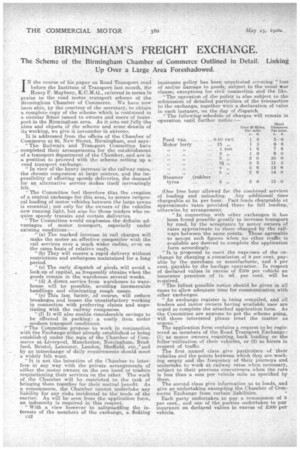BIRMINGHAM'S FREIGHT EXCHANGE.
Page 20

If you've noticed an error in this article please click here to report it so we can fix it.
The Scheme of the Birmingham Chamber of Commerce Outlined in Detail. Linking Up Over a Large Area Foreshadowed.
IN the course of his paper on Road Transport read before the Institute of Transport last month, Sir Henry P. Maybury, K.C.M.G., referred in terms fo praise to the road motor transport scheme of the Birmingham Chamber of Commerce. We have now been able, by the courtesy of the secretary, to obtain a complete copy of the scheme which is contained in a circular retter issued to owners and users of transport in the Birmingham area. As it sets out fully the aims and objects of the scheme and seine details of its working, we give it hereunder in extenso.
It is addressed from the offices of the Chamber of Commerce at 95, New Street, Birmingham, and says: " The Railways and Transport Committee have completed their arrangements for the establishment of a transport department of the Chamber, and are in a position to preceed with the scheme setting up a road transport exchange.
" In view of the heavy increase in the railway rates, the chronic congestion at large centres, and the impossibility of effecting speedy deliveries, the demand for an alternative service makes itself increasingly felt. "
" The Committee feel therefore that the creation of a central exchange for this area, to secure reciprocal loading of motor vehicles between the large towns is essential.; not only for the owners of the vehicles now running light, but also for those traders who require speedy transits and certain deliveries.
• " The Committee would emphasize the definite advantages of motor transport, especially under existing conditions :— " (a) The marked increase in. rail .charges will make the motor an effective competitor with the rail services over a much wider radius, even on the same basis of relative costs.
"(b) They will ensure a rapid delivery without restrictions and embargoes maintained for a long period.
" (c) The early dispatch of gOods will avoid a look-up of capital, as frequently obtains when the goods remain in the warehouse several weeks.
" (d) A direct service from warehouse to warehouse will be possible, avoiding innumerable handlings and eliminating rough usage.
"(e) This last factor, of course, will reduce breakages and lessen the unsatisfactory working in connection with preferring claims and negotiating with the railway companies. " (0 It will also enable considerable savings to be effected in packing: a costly item under modem transport conditionS.
"The Committee propose to work in conjunction with the Exchange either already established or being establish 3d under the mgis of the Chamber of Commerce at Liverpool, Manchester, Nottingham, Bradford, Bristol, Leicester, London, Sheffield, etc., and by an interchange of daily requirements should meet • a widely felt want. . "It is not the intention of the Chamber to interfere in any way with the private arrangements of either the motor owners on the one hand or traders requisitioning their services on the other. The work of , the Chamber will be restricted to the ta..k of bringing them together for their mutual benefit. As n. consequence, the Chamber cannot undertake any liability for any risks incidental to the! trade of the carrier. As will be seen from the application form, an indemnity, is required in this respect. "With a view however to safeguarlding the interests of the members of the exchange, a fioSting c12 insurance policy has been negotiated covering "loss of and/or damage to good, subject to the usual war clause, exceptions for civil commotion and the like.
"The operation of the policy is also subject to the submission of detailed particulars of the transaction to the exchange, together with a declaration of value in each instance, on the day of eispatch.
• (One free hour allowed for the combined services of loading and unloading. Any additiona time
chargeable at 5s per hour. Part loads chargeable nit approximate rates provided there be full loading, otherwise by arrangement.
" In connection with other exchanges it has been found possible greatly to increase transport by road, by the acceptance by motor owners of rates approximate to the charged by the railways between the same points. Those agreeable to accept such figures when no other traffic is available are 'desired to complete the application form accordingly.
"It is proposed to meet the expenses of the axchange by charging a commission_ of per cent, pay able by the merchant or manufacturer, and 5 per cent.. payable by the haulage contractor. In respect of declared values in excess of £300 per vehicle an insurance premium of is. 6d. per cent. will be required.
" The fullest possible noticeshould be given in all eases to allow adequate time for communication with other exchanges.
" An exchange register is being compiled, and all traders and motor owners having available user are urged to complete the attached application form. As the Committee are anxious to get the scheme going, will those interested please treat the matter as urgent."
The application form contains a request to be registered as members of the Road Transport Exchange: (1) as motor owners requiring back loading or the fuller utilization of their vehicles, or (2) as hirers in respect of traffic. The first named class give particulars of their vehicles and the points between which they are work ing empty and the frequency of their journeys and undertake to work at railway rates when necessary, subject to their preyioes concurrence when the rate is less than a, sum per vehicle mile as specified by them.
The second class give information as to loads, and give an undertaking exempting the Chamber of CommerceExchange from certain liabilities.
Each party undertakes to pay a commission of 5 per cent., and one of the parties undertakes to pay mstiranc"(i on deolared values in excess of g300 per vehicle.




























